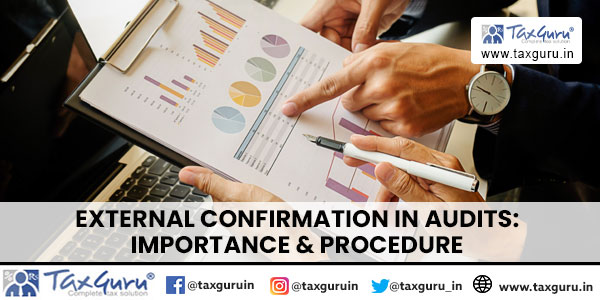External Confirmation during an audit means audit evidence obtained as a direct response to auditor from third party.
SA 505 deals with external confirmation, it indicates that the reliability of audit evidence is influenced by its source and by its nature, and is dependent on the individual circumstances under which it is obtained.
Why there is a need of External Confirmation?
- External evidence is more reliable than the internal evidences
- Evidences obtained directly by auditor are more reliable than obtained indirectly
- Documentary Evidence, whether paper, electronic or other medium are more reliable than the Oral evidences
When External Confirmation is required during an audit?
- Account Receivable – Auditors often confirms the existence and validity of receivable balance by directly contacting customers for the balance owed to them.
- Account Payable – Auditor may confirm the accuracy and validity of amount owed by entity to its suppliers or vendors.
- Bank Balance and Transactions – Auditor can confirm bank balance and transactions directly with the financial institution to verify cash balance, loans, overdraft, and other financial transactions.
- Investments – External confirmation is required to confirm the ownership and valuation of investment held by the entity.
- Loans and Borrowings – Confirmation may be taken from lenders or financial institution to verify the existence, terms, and balance of any loans and borrowing reported by entity.
- Contractual Agreements – Auditors may confirm the terms, conditions, and existence of contracts such as sale agreements, lease, or purchase contracts.
- Litigation and claims – External Confirmation may be taken to verify existence and status of litigation or clams.
- There are others events or transactions where external confirmation may be required such as Related Party Transaction or Subsequent events.

Key Consideration while seeking External Confirmation:
1. Materiality – Auditors prioritize items that are material to the financial statements.
2. Risk Assessment – Confirmation Procedure are based on the assessed risk of material misstatement.
3. Reliability of Evidence – Auditors shall assess the reliability of confirmation response obtained whether they provide sufficient or appropriate audit evidence.
External Confirmation Procedure :
- Identify the Information which is to be obtained
- Select the third party to whom inquiry will be made
- Design the Confirmation (Positive/ Negative)
- Positive confirmation request – A request where auditor needs response in every case whether third party agrees or not Negative Confirmation request – A request where auditor needs response only when third party disagrees.
DRAFT OF A CONFIRMATION REQUEST
Suppose you are an intern at a CA firm ABC LLP, on a audit engagement of a company, SH LTD. You have been asked by your senior to sent a confirmation request to one of its customer, GMC LTD regarding an amount of ₹58000 receivable from them.
May 20, 2024
GMC LTD
Dear ………….
This request is being sent to you to enable our independent auditors, ABC LLP, to confirm the correctness of our records. It is not a request for payment.
Our records showed an amount of ₹58000 receivable from you.
Please confirm whether this agrees with your records on that date by signing and returning this directly to our auditors, ABC LLP. An addressed envelope is enclosed for this purpose.
If you find any difference, please report details directly to our auditors in the space provided below.
Regards,
………….




